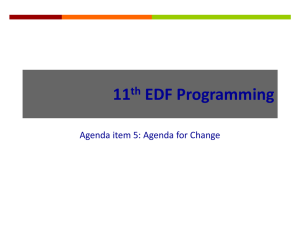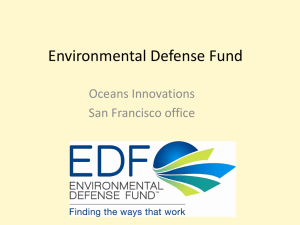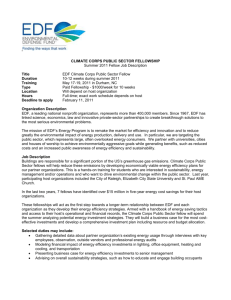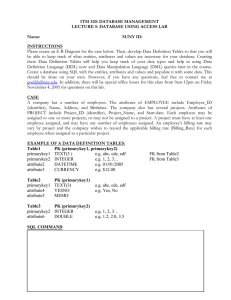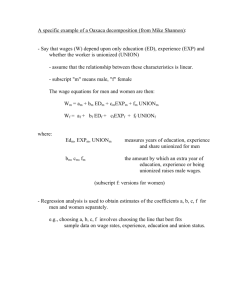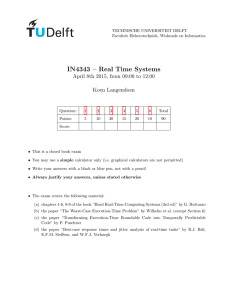Future prospects for EDF’s human resources in nuclear Manchester University 26 March 2008
advertisement
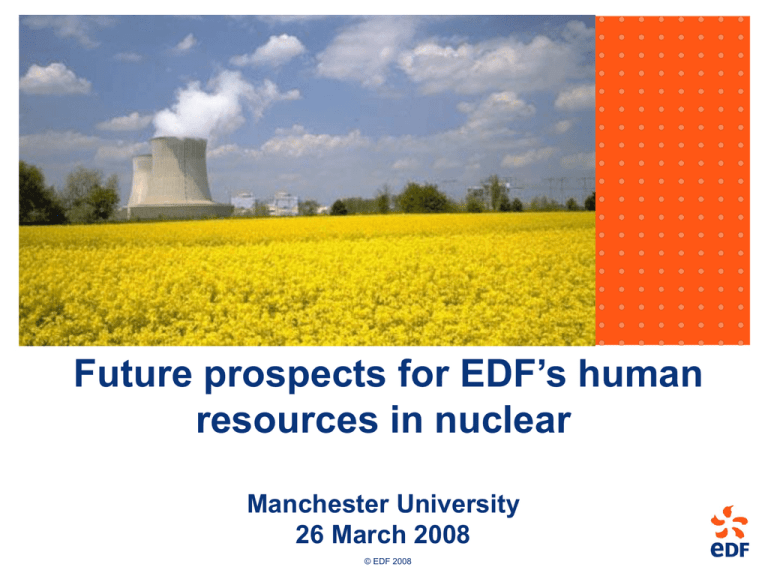
Future prospects for EDF’s human resources in nuclear Manchester University 26 March 2008 © EDF 2008 Future prospects for EDF’s human resources in nuclear 1. How things stand 2. Our needs 3. Expectations for the future, to attract more talented people © EDF 2008 1 How things stand © EDF 2008 3 strategic priorities for the development of nuclear • Continue French Nuclear fleet operations: ongoing improvement in safety and extended lifespan for the NPPs, learn from each year of operating experience, • Participate in the global development of nuclear: • In France, construction of the Flamanville 3 EPR, • Within the EDF Group, support the affiliate companies that are (or are going to be) nuclear operators, • Internationally, participate in the global revival of nuclear, together with China, UK, USA, South Africa, …... • Prepare for the new reactors by supporting international research programmes on Generation IV reactors. © EDF 2008 2 Our needs © EDF 2008 The energy sector is currently not sufficiently attractive Breakdown of engineering graduate recruitment in 2006 in France Automotive industry and transport Information technology (services) Construction and civil engineering 17% 16% Consultancy 3% 4% 15% Energy Finance, Banking, Insurance, Audit 5% 5% Chemical industry 6% 9% 10% 10% Agri-food industry Information Technology industry Agriculture Others sectors The recruitment market for engineers is highly competitive © EDF 2008 Skills a key priority: a challenge as well as an opportunity…. In the nuclear energy branch in France • Over the next 10 years, a significant level of retirement departures across the whole branch: operations, engineering and research, engineers and technicians, • Major resource requirement for new projects. In EDF • Over the next 10 years, 40% of employees in the nuclear branch will retire, including more than 4,000 engineers and executives in operations, engineering and R&D, • New international projects: more than 500 engineers by 2010 (French and other nationalities). We want to recruit the future managers of tomorrow’s company © EDF 2008 Trend in the recruitment of engineers in EDF’s Nuclear Operations EDF 700 600 500 400 EDF 300 200 20 15 20 14 20 13 20 12 20 11 20 10 20 09 20 08 20 07 20 06 20 05 20 04 20 03 100 0 To maintain and develop EDF’s leadership in the nuclear field the company needs to recruit 5,000 engineers over the next 10 years : 4 times its previous level. And in the same time : • A strong competition on the recruitment market of engineers, demand is higher than the offer, • French and European education systems are unable to provide enough graduates at a sufficient level. © EDF 2008 Recruitment of engineers by EDF, in the field of nuclear Chemistry Environment Design, Process Thermohydraulics Calculation code Signal processing Radiation protection 2% 4% 2% Instrumentation Control and Indus. Info. 15% 10% Safety, Fuel, Neutron Physics 14% Operations 25% 11% 6% 11% Electromechanical Engineering © EDF 2008 Civil Engineering Metallurgy, Structure of Materials, Non intrusive Control 3 Expectations for the future, to attract more talented people © EDF 2008 Our expectations: • We want to attract a greater proportion of future graduates to energy across the board (low-carbon generation, greenhouse gas limitation, and nuclear generation), and offer them the opportunity to build their career around energy, • We are broadening our recruitment approach: countries, qualifications, apprenticeships, etc. • We hope that education opportunities in nuclear and energy will be more visible and more attractive to students, • We need the Education system to provide enough graduates of the required level in nuclear and energy generation technologies. © EDF 2008 We are sponsoring 3 new educational initiatives: A joint cooperation together with ParisTech (engineering schools regrouped around Ecole Polytechnique), Ecole Centrale Paris, Supelec, INSTN (National Institute for Nuclear Science and Technology) and Paris – Orsay University, aimed at: 1. Strengthening and structuring the energy curricula in the “Grandes Ecoles” 2. Establishing an international Masters degree, for French and nonFrench students (2 year teaching programme, lectures in English) 3. This Masters will cover the whole field of nuclear energy: engineering, operations, decommissioning and waste management, fuel cycle, A first module will start in September 2008 (objective: 25 to 30 students). The whole cycle will be operational in September 2009 (80 students; over 100 students when fully up to speed), ParisTech, Centrale, Supelec, INSTN and Paris-Orsay University are involved in this project. Establishing some post-Master professional certification with the best Universities and “Grandes Ecoles” (e.g.: nuclear safety, chemistry, etc.) © EDF 2008 EDF contributions : • Main contributions: Issue the International Masters (2008: 1st step / 2009: full operation), Creation of professorships, especially for the International Masters, Make some EDF employees available for teaching, and to represent the Group to schools and universities, Use of EDF simulators in the teaching programmes, Develop partnerships with universities in France, Germany, the UK, China, the USA, South Africa, Italy, Switzerland, etc. Offer the best students: grants, internships, individual sponsorship, prerecruitment etc. To maintain these initiatives over the long term, the EDF Group has announced the creation of the “European Foundation for Tomorrow’s Energies” © EDF 2008
